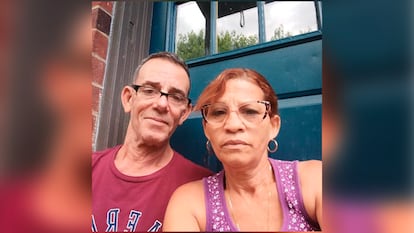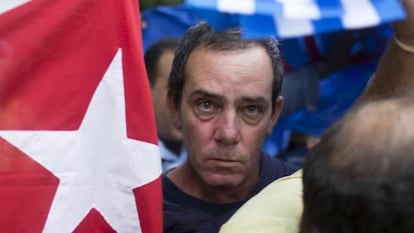Political prisoner Lázaro Yuri Valle’s parole revoked: ‘If they deport me, I’ll continue fighting for Cuba’
The journalist was released from a Havana prison last June and allowed into the United States under a permit granted by the Biden administration. Now, the Trump administration is demanding he return to the island or face deportation


The authorities at Combinado del Este, the maximum-security prison on the outskirts of Havana, led him out in handcuffs and up to the fifth floor of the National Hospital, where they strapped him to a gurney. He was emaciated — just skin and bones. It’s said that when his wife walked into the clinic and saw him, she broke down in tears, screaming that he was going to die, that they’d been killing him slowly for some time.
Under the watchful eyes of Cuban agents, the two then made their way to José Martí International Airport. Lázaro Yuri Valle Roca and Eralidis Frómeta — known as Lily — left Cuba on June 5, 2024, as beneficiaries of the U.S. humanitarian parole program extended by the Biden administration to Cuban citizens. He still had two years left on his sentence. The Cuban government’s message was clear: leave the country, or die in prison.
That final day was strange. Cuba was home — his cramped room in Nuevo Vedado, stifling and humid, but his. He was leaving, in a way, against his will. He’d traveled before for professional reasons, had multiple U.S. visas, but had always come back. On his last day in Cuba, Lázaro, now 63, didn’t have time to say goodbye to his neighbors or his neighborhood, and or to collect his belongings. Lily packed what mattered: photos of his mother and grandparents — his whole childhood. She also packed a pair of pants and a sweater, the only clothes he would wear on their journey north.
The agents stayed with him until the very end. If his phone rang at the airport, they stood next to him to hear the conversation. If he moved, they moved with him. When it was time to board, they escorted him onto the plane, buckled him into his seat, and instructed the crew not to let either of them get up until the plane had taken off. Lázaro didn’t leave Cuba like the nearly 111,000 Cubans who have fled under the humanitarian parole program since early 2023 — a legal pathway to escape a country in freefall, without food, medicine, or electricity. A jungle. Lázaro left as a political prisoner, a dissident, a journalist turned defector, a traitor in the eyes of the regime.

Now he answers the phone from his home in Lancaster, Pennsylvania — he loves everything about the place, except the cold. He’s regaining the nearly 30 pounds (14 kilos) he lost in prison. And he’s learning, bit by bit, to adjust to a new place. “You have to start adapting, because it’s a tough life, but I like it because I have freedom,” he says.
He hadn’t even finished settling in when the order came: return to the country that had effectively expelled him. Return to prison, to mistreatment, to a system that denied him medicine for his many health issues, to beatings and blackmail from jailers. Just days ago, he received the same email sent to thousands of Cubans, Venezuelans, Nicaraguans, and Haitians under the humanitarian parole program: a notice informing them they must leave U.S. territory within 30 days — or they will automatically be reclassified as undocumented immigrants.
“You should depart the United States now, earlier, but no later than the date of the termination of your parole,” the message read, also notifying them that their work permits, previously guaranteed by the program, would be revoked.
“When I read that email, I had mixed feelings. I asked myself, ‘Why?‘” he says. “If you want to clean your house, you get rid of parasites and insects, but there are some that aren’t bad, like bees, which provide honey and are hard workers. I think a selection should have been made, analyzing each case, understanding why we’re here.”
The government’s deadline is April 24. After that, parole beneficiaries like Lázaro will be considered undocumented, subject to the same fears millions already face: fear of leaving home, fear of working, fear of seeking medical care. But Lázaro says he hasn’t felt that fear. As if his body had been hardened by horror. “I’m worried thinking about having to go back to Cuba. But what fear can I possibly have now, if there, I already faced a monster and unrestrained repression?” he says.
Lázaro has known terror since childhood — since Fidel and Raúl Castro visited his home. He is the grandson of Blas Roca Calderío, a top political figure during the early years of the 1959 Cuban Revolution. He witnessed the inner workings of the regime, understood how its leaders operated, and saw the ruin they were steering the country toward. “I was always a rebel against the government,” he says.
As an adult, he became a member of the opposition, one of the “worms,” a dissident. A child raised to be a loyalist, he grew into a young man who declared war on Castroism.
Lázaro’s life in Cuba was a cycle of beatings, prison, and threats. He was targeted for his work as an independent journalist and activist. He reported on the marches of the Ladies in White — mothers, sisters, and wives of political prisoners. More than once, he ended up beaten by the police for his work. He reported evictions. He was fined and spent several days in jail. His last offense earned him a five-year sentence, which he was serving when he left Cuba less than a year ago.
On the morning of June 14, 2021, he stood on a balcony on Zanja Street in central Havana. A companion tossed hundreds of leaflets into the air — flyers quoting national heroes José Martí and Antonio Maceo. Lázaro filmed them fluttering down over passersby, who picked them up with a mix of surprise and fear. He uploaded the footage to YouTube. Hours later, he was arrested.
But that wasn’t the worst of it. When, one month later, on July 11, 2021, unprecedented anti-government protests erupted across almost all of Cuba — protests that would leave more than 1,500 citizens behind bars as political prisoners — Lázaro was accused of having incited the demonstrations. “They wanted to sentence me to 30 years because they said I was a ringleader, an instigator. They wanted to charge me with sedition, to blame me for what happened.”
While imprisoned, international human rights organizations repeatedly denounced the treatment he received and the serious deterioration of his health. During those years, he suffered vision loss, kidney failure, a deviated septum from beatings, and chronic bronchopneumonia. In three years, he received little to no medical attention.
It was his wife who did everything possible to find a relative willing to sponsor him and thus get him out of the country through the parole program. Lázaro is relieved and has no intention of returning for now. He insists that “his fight is in Cuba,” but at this moment, he prefers to remain calm. He is beginning the process of applying for political asylum, but says that if one day the Donald Trump administration deports him, and he ends up back in Havana, he won’t stay silent: “I am going to return shouting ‘Down with Miguel Díaz-Canel’ and ‘Long live free Cuba.’ I’m not going to enter as a docile dove; I’m going to keep fighting.”
Various sectors of the Cuban community have expressed concern about what could happen to Lázaro and his wife. “If he’s deported to Cuba, there is a very high risk that he could end up back in prison at any moment, given his past as an independent journalist and activist,” Cuban lawyer Raudiel Peña Barrios, a member of the legal advisory group Cubalex, told EL PAÍS.
Many have called on the Republican government to take his case into consideration. The Committee to Protect Journalists (CPJ) urged U.S. authorities to “rescind this letter.” The Cuban Prison Documentation Center warned of the dangers of a possible deportation. “It is imperative that the international community and human rights organizations show solidarity with this cause, demanding that they be granted protection and the right to asylum,” the group stated. “Their return to Cuba would condemn them to reliving the hell they managed to escape.”
Sign up for our weekly newsletter to get more English-language news coverage from EL PAÍS USA Edition
Tu suscripción se está usando en otro dispositivo
¿Quieres añadir otro usuario a tu suscripción?
Si continúas leyendo en este dispositivo, no se podrá leer en el otro.
FlechaTu suscripción se está usando en otro dispositivo y solo puedes acceder a EL PAÍS desde un dispositivo a la vez.
Si quieres compartir tu cuenta, cambia tu suscripción a la modalidad Premium, así podrás añadir otro usuario. Cada uno accederá con su propia cuenta de email, lo que os permitirá personalizar vuestra experiencia en EL PAÍS.
¿Tienes una suscripción de empresa? Accede aquí para contratar más cuentas.
En el caso de no saber quién está usando tu cuenta, te recomendamos cambiar tu contraseña aquí.
Si decides continuar compartiendo tu cuenta, este mensaje se mostrará en tu dispositivo y en el de la otra persona que está usando tu cuenta de forma indefinida, afectando a tu experiencia de lectura. Puedes consultar aquí los términos y condiciones de la suscripción digital.








































